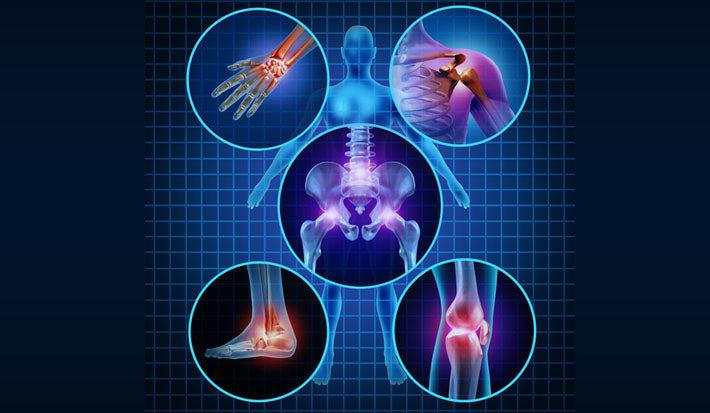Joint problems can really put a crimp in your mobility, making it difficult to carry out even the most basic daily tasks. Often, symptoms of pain and stiffness may be signs of bone deterioration, so taking steps to eliminate discomfort can go a long way toward protecting your joint health. Like the rest of the body, the foods you eat each day affect the health of your joints in a big way. Eating foods that support joint health not only helps reduce discomfort but also improves the body’s overall health. Keep reading to find out what foods to include in your diet and which foods to avoid at all costs to help you care for your joints.
 Dark green leafy vegetables, such as collard greens, kale, and spinach, contain high amounts of antioxidants. Antioxidants work to kill off invading bacteria and toxins inside the body’s cells and tissues, including the cells and tissues that make up joints. These greens are also rich in sulforaphane, a substance that’s known to block the enzyme processes that trigger joint inflammation. Last, dark green leafy vegetables contain a host of phytochemical agents, which help the body’s immune system fight off bacteria and the inflammation that results.
Dark green leafy vegetables, such as collard greens, kale, and spinach, contain high amounts of antioxidants. Antioxidants work to kill off invading bacteria and toxins inside the body’s cells and tissues, including the cells and tissues that make up joints. These greens are also rich in sulforaphane, a substance that’s known to block the enzyme processes that trigger joint inflammation. Last, dark green leafy vegetables contain a host of phytochemical agents, which help the body’s immune system fight off bacteria and the inflammation that results.
 It may come as a surprise to hear that today’s high-fat, low fiber, sugar-laden Standard American Diet accounts for much of the inflammation that develops throughout the body. The Standard American Diet is highly acidic, which wreaks havoc on joint health as well as on the health of the body as a whole. The Hallelujah Diet, a plant-based diet and lifestyle, offers a long-term solution for combating joint pain. Not only that, the Hallelujah Diet is designed to feed and support the body’s natural self-healing mechanisms, which translates into improved overall health on an ongoing basis. While you should definitely include more plant-based foods in your diet to improve joint health, a plant-based diet offers the level of nutrition that promotes overall optimal health for the long-term.
It may come as a surprise to hear that today’s high-fat, low fiber, sugar-laden Standard American Diet accounts for much of the inflammation that develops throughout the body. The Standard American Diet is highly acidic, which wreaks havoc on joint health as well as on the health of the body as a whole. The Hallelujah Diet, a plant-based diet and lifestyle, offers a long-term solution for combating joint pain. Not only that, the Hallelujah Diet is designed to feed and support the body’s natural self-healing mechanisms, which translates into improved overall health on an ongoing basis. While you should definitely include more plant-based foods in your diet to improve joint health, a plant-based diet offers the level of nutrition that promotes overall optimal health for the long-term.
What Causes Joint Pain?
With over 100 arthritis-related conditions involving some form of joint discomfort, any number of factors can contribute to persistent joint pain. More often than not, inflammation plays a central role in causing joint discomfort, especially as the body ages. Inflammation develops when tissues undergo damage as a result of bacteria, trauma, toxins, or other causes. In response to the damage, surrounding blood vessels release fluid into the tissues to protect the area. These conditions cause the swelling and discomfort that comes with joint pain. If your diet contains high levels of acidic foods, the effects of a high-acid diet can cause joint health to deteriorate. Acidic foods actually have inflammatory properties that weaken the bones, making them more susceptible to damage. Here are some foods you might want to avoid if you’re experiencing joint problems:- Fast foods
- Sugary foods
- Foods with a high flour content
- Sodas
- Fried foods
- Trans fats
- Meats
- Dairy products
Foods That Support Joint Health
Maintaining a neutral acid-alkaline level, also known as body pH, is essential to the health of the body, joint health included. In turn, foods that support a healthy body pH can help with reducing inflammation while also strengthening bone tissue. The following are a few of the foods you’ll want to eat for joint health.Foods High in Omega-3 Fatty Acids
When it comes to anti-inflammatory agents, omega-3 fatty acids win hands down. Numerous research studies have shown omega-3s to be highly effective at reducing and even reversing the progression of conditions involving inflammation, including joint-related problems. Foods high in omega-3 fatty acids include:- Chia seeds
- Hemp seed
- Pure, clean fish oil
- Walnuts
- Flaxseeds
- Flaxseed oil
Dark Green Leafy Vegetables

Berries
Besides being nutrient-dense foods, berries contain anthocyanins, a group of antioxidant compounds that work to reduce inflammation throughout the body. Anthocyanins are also what give berries their deep, rich colors. Berries contain yet another antioxidant material that aids in joint health, called ellagic acid. Ellagic acid specifically targets inflammation inside the joints, which may help in reducing joint pain.Foods Rich in Calcium
It’s no secret that foods rich in calcium support bone health. Cow milk, in particular, has been widely advocated by public health authorities as being good for the bones since it’s high in calcium. What’s not so widely known is that the body doesn’t properly absorb calcium and vitamin D unless a balanced mix of other important minerals, such as magnesium and potassium is present. Cow milk doesn’t contain these minerals. Fruits, nuts, and dark green leafy vegetables not only provide hefty doses of calcium but also the balanced mix of minerals the body needs to absorb and use calcium. This means if you’ve been drinking milk to support your joint health, eat more plant-based foods instead. You also need to get enough sunshine to support healthy vitamin D levels, or use a supplement such as Hallelujah Diet’s Vitamin D3-K2.The Hallelujah Diet - Healthy Eating for Healthy Joints and So Much More









1 comment
Kerri
Thank you for this post. It came into my email on the very day that I’ve decided to get healthy the natural way.
Thank you for this post. It came into my email on the very day that I’ve decided to get healthy the natural way.